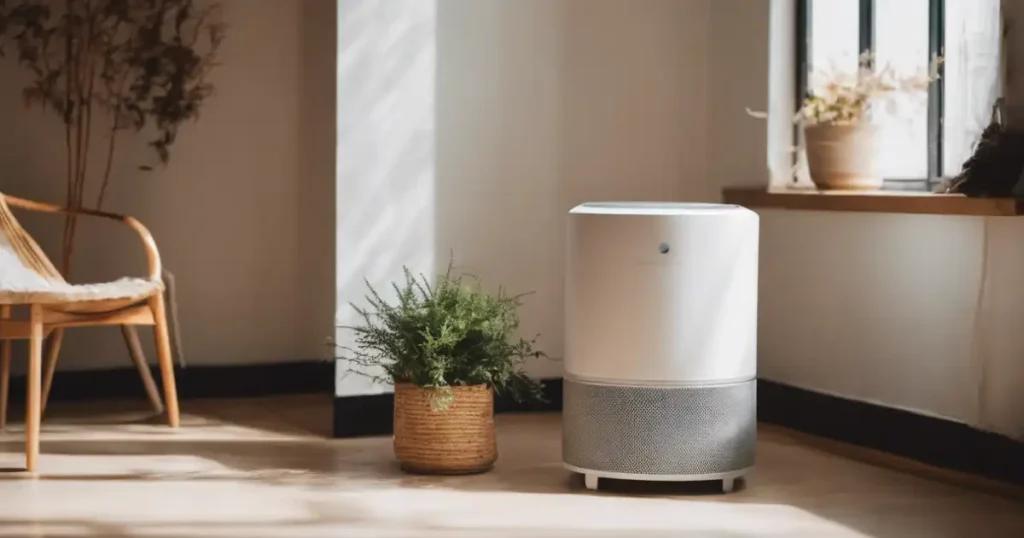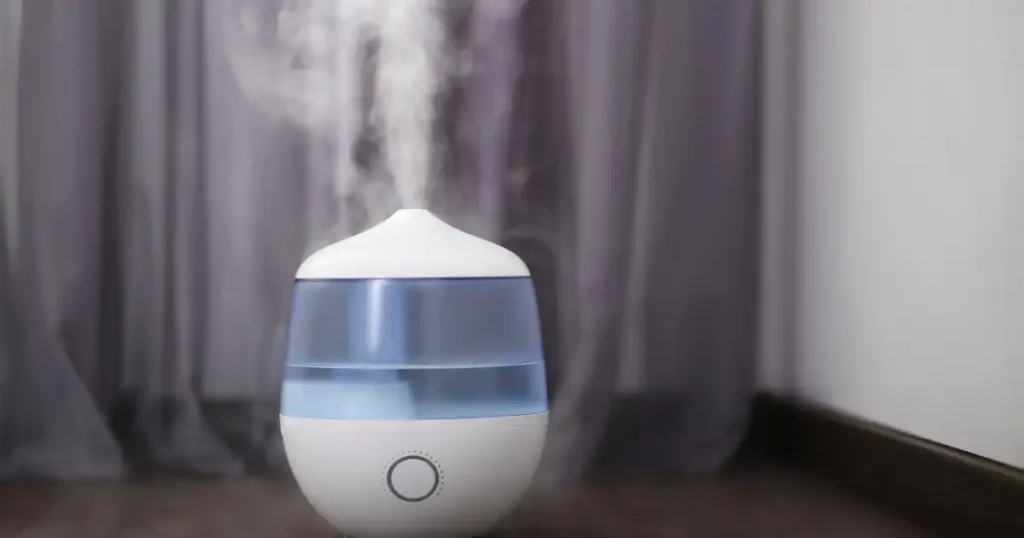In the quest for cleaner, purer air, many of us turn to air purifiers as our trusty companions in the battle against dust, allergens, and pollutants. These sleek devices promise to create a healthier living space, but there’s a persistent myth that seems to linger in the air. Do air purifiers dry out the air in your home? It’s a question that often floats in the minds of those considering the leap into the world of air purification. So, is it true?
No, Air purifiers do not typically dry the air. They don’t have any inherent ability to change humidity in a given space. Their primary function is to remove pollutants from the air, not moisture.
Concerned about the perceived dryness? Read on to discover the truth about air purifiers and their impact on your indoor environment!
How Does an Air Purifier Work?
Before digging into their impact on humidity, it’s essential to understand how these devices work. Air purifiers clean indoor air through a multi-layered filtering system. This system is specifically designed to trap various pollutants as air passes through. Let’s break down the key components and filtration stages inside most modern home air purifiers:
– The Air Intake & Pre-Filter
Polluted air first gets sucked into the purifier via the air intake, usually a vented opening on the side or back of the device. It immediately hits a pre-filter, typically made from a basic mesh screen or foam layer. The pre-filter captures large visible particles like hair and dust debris.
– The HEPA Filter
The True HEPA filter uses dense microfiber layered sheets designed to trap ultrafine particles 0.3 microns in size. This includes allergy triggers like mold, pet dander, and pollen.
– The Activated Carbon Filter
After clearing microscopic allergens, the scrubbed air passes through the activated carbon filter. The activated carbon filter contains highly porous carbon granules. These granules have a massive surface area for trapping gases, fumes, and odors through chemical adsorption.
So, having explored the inner workings of these machines, let’s now shift our focus to the pivotal question.
Do Air Purifiers Dry Out the Air?

Now, we come to the main question at hand about moisture levels. Do air purifiers make the air dry while they perform their cleaning duties? The answer is simply no. These devices do not have the ability to add or remove moisture from the air.
The filtration process described earlier involves the air passing through different layers, including pre-filters, HEPA filters, and activated carbon filters. These components target particles, allergens, and odors, but they do not reduce indoor humidity.
Let’s talk about specific types of air purifiers, like the ones with built-in humidifiers. These units might influence humidity levels. But it’s essential to know that this impact comes from the humidifier function, not the air purification process itself.
Moreover, some air purifiers have a UV-C light feature to kill bacteria, viruses, and mold spores. They may cause a slight decrease in humidity, but it is minimal and not enough to dry out the air.
Simply put, air purifiers lack any active drying capacity in their working mechanism. Using one alone indoors shouldn’t dry the air unless you already have lower humidity issues.
Does an Air Purifier Make Your Throat Dry?
Some folks complain about waking up with an irritated, dry throat that seems worse on days when the air purifier is running all night. What explains this phenomenon if the purifiers themselves don’t remove moisture?
When the air feels dry, many people immediately focus on insufficient humidity levels as the culprit. However, low humidity alone rarely causes acute physical throat irritation. More often, this signals the air contains other irritants the purifier’s filter has just captured from circulation.
For example, smoke residue trapped overnight could be causing the scratchy roughness. With the air no longer filled with loose, smoky particulates thanks to the purifier, you experience a stark contrast. This contrast highlights irritation from toxic compounds left behind on surfaces. The refreshed, cleaner air flowing over existing environmental residue aggravates rather than soothes.
This doesn’t indicate the air purifier itself dried out the air. Just that the cleaner air it produced allowed a better perception of existing irritants. So, focus on addressing the source contaminants rather than blaming humidity or the helpful purifier.
Why Do You Feel the Air Purifier is Drying Out the Air?
With air purifiers not directly responsible for removing moisture, what accounts for dry air around your space? Here are the most likely explanations behind the dry air mirage in homes using these beneficial devices:
1. Pre – Existing Dry Air
If the air was overly dry in your home before getting an air purifier, it will still feel too dry after you start using one. The air purifier does not make it worse or better. You had a pre-existing dry air problem. Get a hygrometer to monitor your home’s humidity levels first before jumping to any conclusions.
2. Air Circulation
Air circulation from the purifier can make your skin and eyes feel drier over time. Consider how the air moves when your air purifier is in action. Picture it like a fan stirring up the air in the room. Sometimes, this increased movement can give the sensation of dryness, even though the actual humidity may not have changed.
3. It’s Winter
The air gets colder during winter, and cold air tends to hold less moisture. It becomes even drier when we warm up this cold air inside our homes. Heating systems in winter can make the overall humidity drop, making the air feel dry. This natural decline in humidity during winter is a usual reason why the air seems less comfortable.
4. The purifier is Placed Too Close to You
Proximity matters! If the air purifier is too close to where you spend most of your time, like your bed or desk, you might feel the effects more strongly. Try adjusting the placement to find that sweet spot where it cleans the air without making it uncomfortably dry for you.
Before blaming a likely innocent air purifier for dried air, analyze if the actual measured humidity has reduced in the room. Confirm you don’t have bigger contributing factors at play, drying out the entire home itself seasonally.
The Effects of Dry Air on Your Health
Now that it’s clear air purifiers don’t inherently sap away all moisture, should you still worry about indoor air dryness itself for health reasons? Absolutely! Don’t downplay the many problematic effects dry air can bring up over time:
- Congestion and Respiratory Issues:
Breathing extremely dry air constantly dehydrates and irritates nasal passages and throat tissue. This leads to chronic stuffy nose, swollen nasal tissue, coughing, and sore throats. Those with respiratory conditions like asthma need to be extra careful when air is drier. - Allergies and Immune Dysfunction:
Dry air damages the protective mucus membrane lining, the respiratory tract that keep out threats like pollen and bacteria. This compromises the body’s first line of defense, increasing the risk of allergic reactions and frequent infections. - Headaches and Fatigue:
Research found headaches occur more in dry air environments below 35 percent relative indoor humidity. Dehydration, irritated sinus cavities and impaired breathing likely contribute to the onset of headaches and migraines. The lack of moisture itself also directly causes feelings of fatigue. - Irritated Eyes and Skin:
Just as dry air robs moisture from respiratory membranes, it also dehydrates moisture-producing skin cells and delicate eye tissues. This leads to red, itchy eyes, blurry vision, flaky skin, chapped lips, and excessive wrinkling over time. - Electric Shocks and Fires:
Extremely dry air causes a build-up of static electricity over insulating materials like clothing, upholstery, and carpets. This greatly increases the odds of getting unpleasant electric zaps all day long. It also escalates fire risk from errant sparks igniting flammable materials around the house. - Asthma and Allergy Flare-ups:
For those already suffering from respiratory issues, severely low moisture often serves as the final straw. It can trigger full-blown attacks and episodes, ultimately requiring hospitalization if unchecked.
Allowing homes to become moisture-devoid poses a significant wellness hazard with heavy consequences. Now, let’s explore constructive solutions beyond merely blaming air purifiers.
How to Prevent Dry Air at Home? 6 Easy Steps to Maintain Humidity

1. Use a Humidifier
The simplest way to directly fight chronically low humidity is by deploying room humidifiers. They add moisture to the air. Topping up moisture levels to 30-50% humidity using these devices offers immense relief and mitigates air dryness.
For whole-home relief, use portable humidifiers around living spaces. This covers all the bases, leaving no room arid enough for dry air health issues to crop up.
2. Keep Indoor Plants
Another easy passive route to upping indoor moisture lies in keeping lush greenhouse plants. Their broad leaves give off water vapor through transpiration while the plants grow. As long as you regularly water plants, this self-sustaining natural humidity upkeep costs nothing! Some effective plants in increasing humidity include Boston fern, spider plant, peace lily, lady palm, etc.
3. Avoid Harsh Indoor Heating
Dry indoor air is inevitably linked with space heating, sapping away any ambient moisture present. Turn down thermostats to the lowest comfortable settings to let in some natural humidity from occupied rooms. Avoid aggressive electric and forced fan heaters blowing intensely dry hot air everywhere.
4. Take Shorter Showers
Taking long, hot, steamy showers frequently flood indoor spaces with moisture. The resulting humidity spike leaves behind severely drier air right after. To counteract this, consider taking shorter showers or lowering the water temperature to maintain a more balanced indoor humidity level. Also, avoid leaving the bathroom door open after showering, as this can allow moisture to escape.
5. Keep Rooms Well-Ventilated
While indoor heating already robs some natural humidity, it gets compounded by stagnant air circulation within closed-off rooms. Keep doors and windows open as much as possible to maintain good airflow and moisture equilibrium with less dry outdoor air. Strategic ventilation replaces depleted oxygen, which is critical for mitigating indoor air staleness.
6. Monitor Humidity Levels
Rather than blindly guessing whether room air feels uncomfortably dry, rely on weather hygrometers. Keep affordable digital or analog humidity gauges around the house in problem areas to see if moisture drops below 30% at any point.
Catching chronically arid rooms early before health consequences set in becomes much more accessible. It also helps accurately set humidifier output and test if other rehydration methods work rather than using the sheer feel of dryness alone.
Conclusion
Air purifiers can significantly enhance indoor air quality and contribute to overall well-being. They effectively eliminate air pollutants, allergens, and harmful particles, ensuring that you breathe clean and fresh air.
Contrary to a common misconception, these devices do not dry out the air; their primary function is not to alter moisture in the air. Maintaining balanced moisture levels is essential for a better living environment.
If you feel like the air is unusually dry in your home, it’s important to take recommended steps to address the issue. Use a humidifier to maintain humidity at optimal levels.
We invite you to explore our blog further for additional insights and practical solutions. Discover more ways to effortlessly enhance the air quality in your home, promoting a healthier and more comfortable life.
FAQs
Do air purifiers cause dry sinuses?
No, Air purifiers do not dry out sinuses. They are designed to filter and purify the air without removing moisture. In fact, they can help alleviate symptoms of dry sinuses by removing irritants from the air, such as dust, pollen, and other pollutants.
Can I leave my air purifier on all night?
It is generally safe to leave air purifiers on throughout the night. However, you should ensure that the purifier is appropriate for the room size and has a low noise level to avoid disrupting sleep. It’s also important to regularly clean or replace the air filters to maintain the purifier’s effectiveness.
Can an air purifier be effective in reducing dust?
Yes, air purifiers can help to reduce dust particles in the air. They work by trapping airborne particles, including dust, in their filters as air circulates through the unit. However, its essential to choose an air purifier equipped with a HEPA filter.
What is the effect of warm air on humidity?
Warm air has a lower relative humidity than cooler air, meaning it has a lower moisture content. So, it can lead to dry conditions, particularly during warmer months when air conditioning systems are often used.
Is it possible for an air purifier to decrease air pollution?
Yes, air purifiers can reduce air pollution by filtering out harmful particles from the air. However, it is crucial to select an appropriate air purifier for the size of the room and the specific air quality concerns.
Are there any side effects of using air purifiers?
An air purifier is generally safe, but some units emit ozone that can harm individuals with respiratory conditions. Choose an appropriate air purifier and consult your healthcare provider for specific health concerns.

